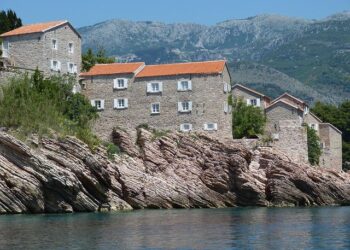The tourism sectors of the United States, Albania, Turkey, and Montenegro have recently demonstrated remarkable growth, signaling a dynamic shift in global travel patterns. As these countries capitalize on their unique attractions and evolving market demands, Greece is positioning itself to strategically leverage emerging trends in sustainability and innovation. This proactive approach aims to enhance its competitive edge in the increasingly eco-conscious and technology-driven tourism landscape, underscoring a pivotal moment for the region’s travel industry.
US Albania Turkey and Montenegro Drive Tourism Surge Highlighting Opportunities for Regional Collaboration
Recent data reveals a notable uplift in tourism across the US, Albania, Turkey, and Montenegro, each exhibiting distinct strengths that contribute to a collective surge in visitor numbers. The US continues to captivate with its blend of urban experiences and natural wonders, while Albania and Montenegro are gaining traction as emerging hotspots for eco-conscious travelers seeking unspoiled coastlines and cultural authenticity. Meanwhile, Turkey’s strategic positioning as a bridge between East and West draws a diverse demographic, attracted by its rich history and modern hospitality infrastructure. This momentum underscores a growing opportunity for these nations to explore *regional collaboration initiatives* that could amplify tourism flows and optimize resource sharing.
Key opportunities emerging from this upward trend include:
- Joint marketing campaigns focusing on sustainable tourism and cultural heritage.
- Cross-border travel packages that encourage multi-country itineraries.
- Shared investment in green infrastructure to enhance eco-tourism offerings.
- Collaborative innovation hubs for digital solutions improving tourist experiences.
| Country | Tourism Growth Rate (2023) | Key Strength |
|---|---|---|
| US | 7.8% | Urban & Nature Diversity |
| Albania | 12.5% | Pristine Coastlines |
| Turkey | 10.2% | Rich Cultural Heritage |
| Montenegro | 14.1% | Eco-Tourism Destination |
Analyzing Sustainability and Innovation Trends Reshaping Tourism Markets Across the Balkans and Beyond
Across the Balkans and neighboring regions, a dynamic shift is underway as sustainability and innovation become central pillars driving tourism growth. Countries like Albania, Montenegro, and Turkey are pioneering eco-friendly initiatives, integrating renewable energy in resorts, and promoting community-based tourism models that not only safeguard natural landscapes but also empower local populations. This transformation is attracting a new wave of conscientious travelers eager to explore destinations that prioritize environmental responsibility alongside authentic cultural experiences. Meanwhile, the United States is leveraging cutting-edge digital tools-such as AI-driven itineraries and immersive virtual tours-to enhance visitor engagement and streamline travel logistics, setting high standards for innovation that the region aspires to emulate.
As these trends gain momentum, Greece is positioning itself strategically to capitalize on emerging opportunities by accelerating investments in smart tourism infrastructure and adopting green certification programs. Key focus areas include:
- Smart mobility solutions to reduce carbon footprints in tourist hotspots
- Integration of blockchain technology for transparent and secure travel transactions
- Promotion of sustainable gastronomy that supports local producers and reduces food waste
Such multi-dimensional approaches not only enhance competitiveness but also promise long-term resilience against global market fluctuations. The interplay between innovation and sustainability is, therefore, reshaping tourism markets, creating a robust framework for growth that can inspire broader adoption across the Mediterranean basin.
| Country | Key Sustainability Innovation | Tourism Growth Rate (YoY) |
|---|---|---|
| Albania | Community-driven eco-tourism programs | 12% |
| Montenegro | Solar-powered beachfront resorts | 10% |
| Turkey | AI-enhanced visitor experience platforms | 15% |
| USA | Virtual reality travel previews | 8% |
| Greece | Smart mobility and green certification | Projected 14% |
Strategic Recommendations for Greece to Capitalize on Emerging Tourism Dynamics and Foster Sustainable Growth
To seize the momentum created by the rapid tourism expansion in neighboring regions, Greece must prioritize a multi-dimensional strategy emphasizing sustainability and innovation. Key initiatives include investing in renewable energy-powered hospitality facilities, promoting eco-friendly transportation options, and developing smart tourism infrastructure that optimizes visitor experience while minimizing environmental footprints. Additionally, embracing digital transformation – from AI-driven travel recommendations to blockchain-based booking platforms – can enhance transparency and foster trust among eco-conscious travelers.
Focused strategic actions to drive Greece’s sustainable tourism growth:
- Enhancing rural and cultural tourism through community-led conservation projects to distribute economic benefits beyond popular cities.
- Partnering with technology startups to create innovative mobile applications that personalize sustainable travel itineraries.
- Implementing rigorous sustainability certifications for resorts and tour operators, elevating Greece’s green tourism credentials globally.
- Expanding educational campaigns on responsible tourism to raise awareness among both tourists and local populations.
| Strategic Focus | Potential Impact |
|---|---|
| Renewable Energy Integration | Reduce carbon emissions by 30% |
| Smart Tourism Technologies | Boost visitor satisfaction by 25% |
| Eco-certification for Operators | Improve market competitiveness |
| Community-led Conservation | Increase rural tourism revenue by 40% |
Final Thoughts
As the US, Albania, Turkey, and Montenegro continue to record impressive tourism growth, the spotlight increasingly turns to Greece’s strategic initiatives aimed at harnessing sustainability and innovation. With emerging trends reshaping traveler expectations and industry standards, Greece is positioning itself to not only keep pace but to lead in creating a more responsible and forward-thinking tourism sector. This dynamic interplay sets the stage for a new chapter in regional tourism, where collaboration and cutting-edge approaches will define the future of travel in Southeast Europe and beyond.
















